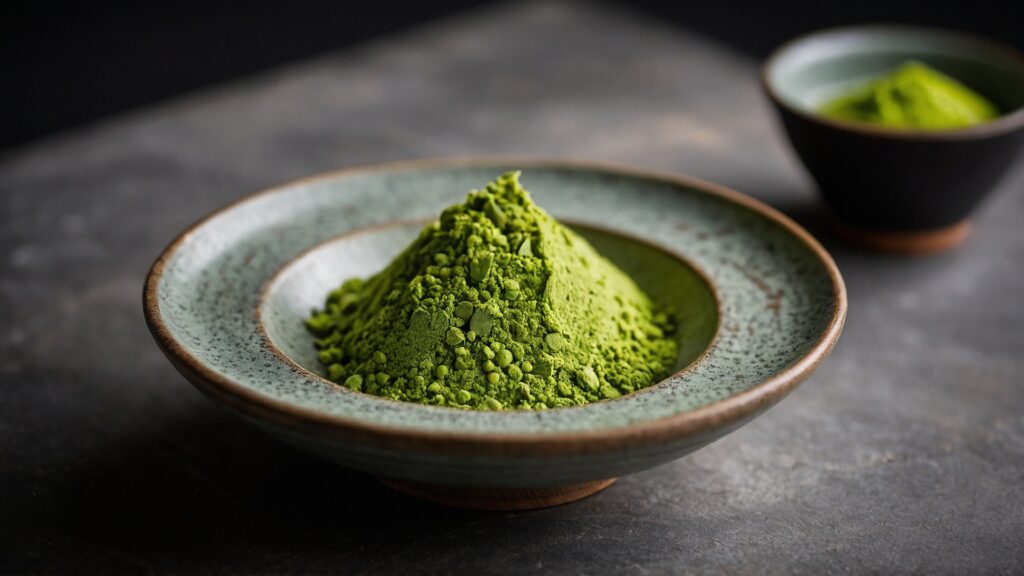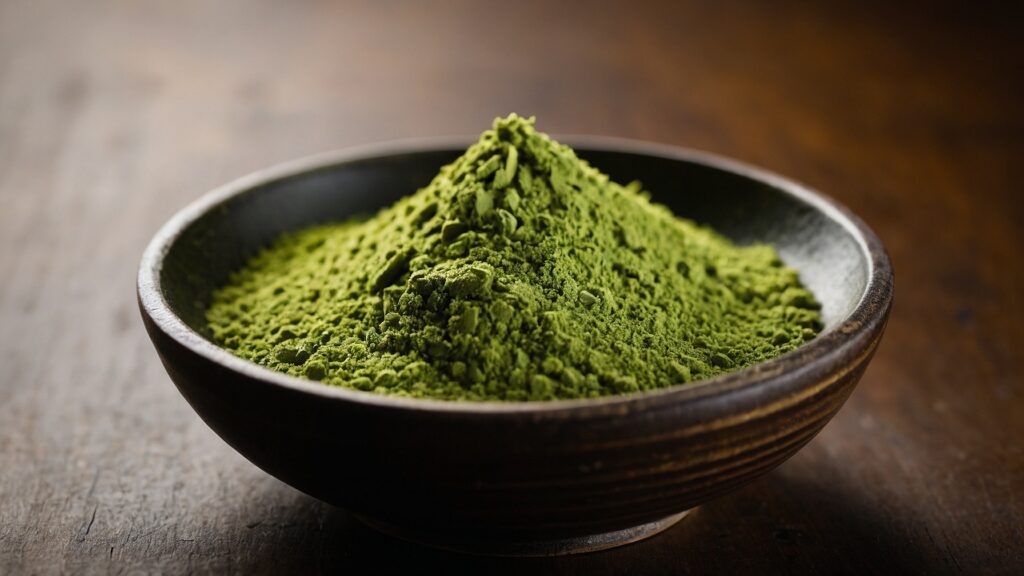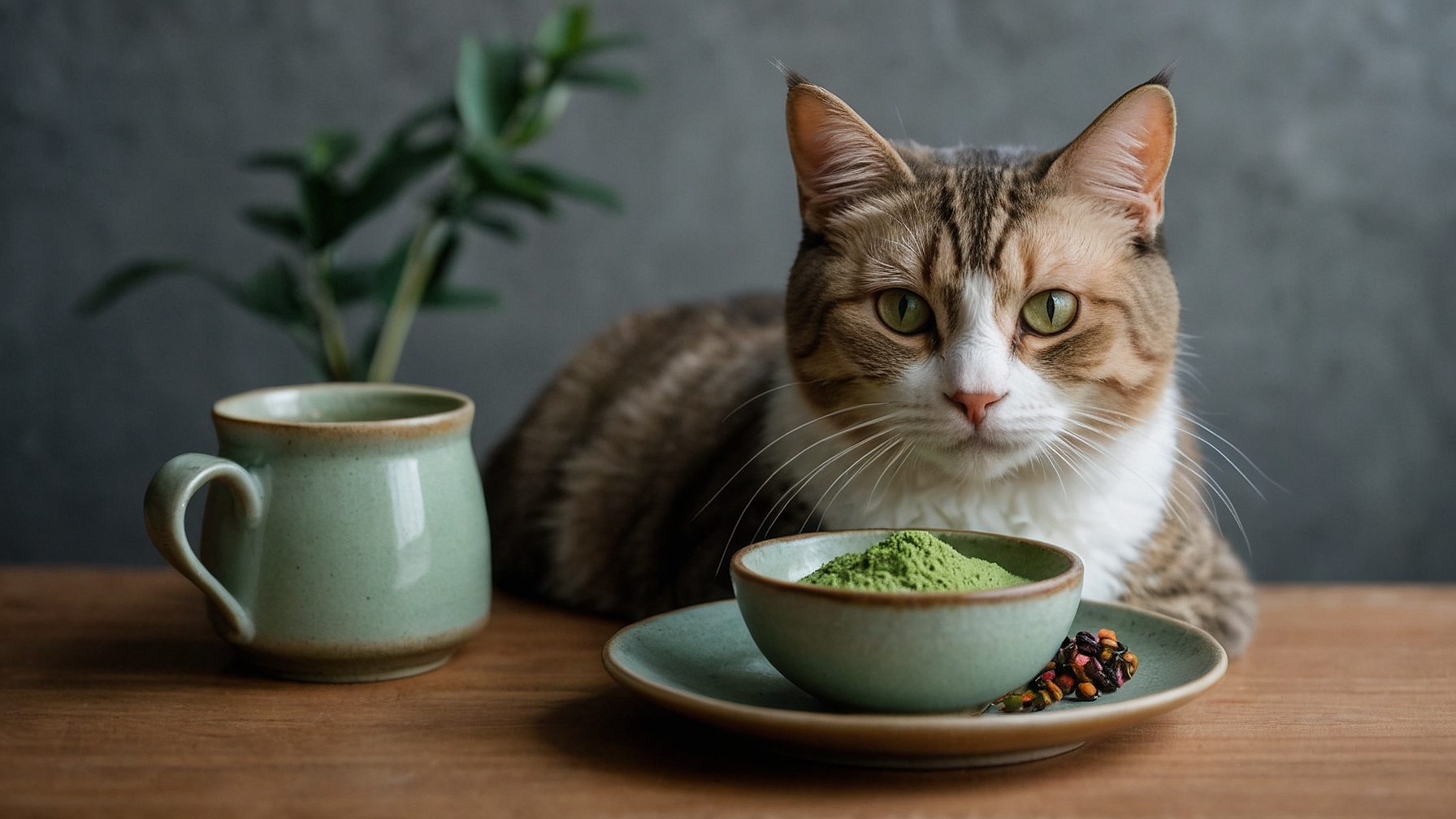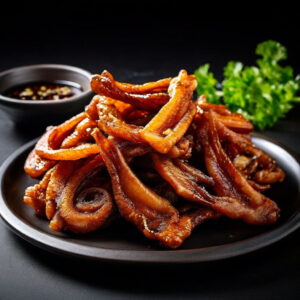Matcha has become an incredibly popular health food and beverage for humans in recent years. This finely ground powder of green tea leaves provides antioxidant benefits, amino acids like L-theanine, and a caffeine boost. But is this bright green powerhouse safe for cats to eat too?
As matcha’s popularity rises, cat owners may be wondering if they can share a bit of their matcha latte or matcha-infused treats with their feline friends. The answer is not so simple. While matcha is not toxic to cats, there are some risks to be aware of. As with any human food or drink, moderation and common sense are key when it comes to cats and matcha.
This comprehensive guide will cover everything you need to know about Can Cats Eat Matcha? , including:
Table of Contents
So brew yourself a cup of matcha tea and let’s get started!
What is Matcha?
Matcha comes from the leaves of the Camellia sinensis plant, the same plant that all true teas come from. But what sets matcha apart is how it is processed. For matcha production, the tea leaves are specifically shaded for several weeks before harvest. This increases the chlorophyll content and amino acid production in the leaves. After harvest, the leaves go through a rigorous process of steaming, destemming, deveining, and slow grinding to produce a fine, bright green powder.
The shade growing and grinding techniques give matcha some unique properties compared to regular green tea. Since the whole leaf is consumed as a powder, you get much higher concentrations of nutrients and antioxidants. A study by the University of Colorado found that:
“Matcha has up to 137 times more antioxidants catechins than a regular cup of brewed green tea.”
The amino acid L-theanine is also found in high levels in matcha. L-theanine promotes relaxation and focus by impacting dopamine and serotonin levels. It also helps offset some of the jittery effects of caffeine from the natural tea caffeine.
So in summary:
- Matcha is: Finely ground green tea leaves grown in the shade
- Flavor: Vegetal, umami, slightly sweet
- Benefits: High in catechin antioxidants, amino acids, caffeine for sustained energy
With this understanding of what matcha is, let’s look at the many benefits it offers us humans next.
Benefits of Matcha for Humans

As a supercharged green tea, matcha offers some amazing health benefits supported by extensive research:
Antioxidants like EGCG
- Epigallocatechin gallate (EGCG) is a potent catechin antioxidant found in high levels in matcha
- EGCG is linked to fighting cell damage that leads to chronic diseases and promoting anti-aging
- Matcha has over 100 times more EGCG than regular brewed green tea
L-Theanine Content
- Unique amino acid found in tea plants that promotes relaxation without drowsiness
- Balances caffeine jitters and helps sustain alert focus
- Enhances mood, concentration, and cognitive performance
Energy Boost from Caffeine
- Provides a smoother energy boost without the crash of coffee
- The combination of L-theanine and caffeine promotes sustained energy and attention
Possible Weight Loss/Metabolism Boosting
- Research shows EGCG may help boost metabolism and burn fat
- Matcha is calorie-free itself, making it a smart addition to a weight loss regime
Improved Concentration and Mental Clarity
- L-theanine and EGCG improve focus, alertness, and memory
- Great before a workout or any mentally demanding task
With all of these research-backed benefits, it’s no wonder matcha has become so popular as a health supplement and ingredient. But can our feline friends benefit from matcha too? Let’s explore that next.
Can Cats Eat Matcha? Is Matcha Safe for Cats to Eat?
When it comes to cats and matcha, safety is uncertain. There has not been much formal research on matcha’s effects on cats specifically. Based on what we know of the ingredients, small amounts of matcha should not harm cats, but it does not offer any nutritional benefits essential for their health either. Here are some factors to consider when giving matcha to cats:
Cats Are Lactose Intolerant
Cats should not be given matcha lattes or other milk-based matcha drinks. Like most felines, cats lack the enzyme lactase needed to digest lactose properly. Milk and dairy can cause digestive upset like vomiting or diarrhea. Stick to water-based matcha drinks only.
Caffeine Content
Matcha contains caffeine like all teas. But cats metabolize caffeine much slower than humans. Excess caffeine can overstimulate a cat’s nerves and cause toxicity. Stick to very small matcha servings for cats spaced out widely.
L-Theanine May Help
The L-theanine in matcha helps create a “calmer” caffeine boost. Through effects on mood-regulating neurotransmitters, L-theanine may counteract some caffeine jitters. But effects are still uncertain in cats.
No Essential Nutrients
Matcha does not provide any nutrients that are essential for a cat’s health. Cats require specific amino acids like taurine, vitamins, and minerals. Matcha should only be an occasional treat.
Best in Moderation
Small amounts of matcha should not harm healthy cats. But it provides no health benefits and risks sickness if they consume too much. Limit matcha to the occasional treat in tiny amounts.
So matcha does not appear to be toxic for cats, but it should be approached with caution. Only offer tiny portions on rare occasions. And be alert for any signs of sensitivity. Next we will cover the potential side effects of matcha in cats.
Risks of Giving Cats Matcha
While matcha poses little risk for humans, even small amounts may cause issues in cats. Here are some potential risks of giving cats matcha:
Upset Stomach or Diarrhea
The compounds in matcha like EGCG and caffeine can irritate a cat’s digestive tract and cause loose stools or vomiting. Kittens and older cats are especially prone to diarrhea.
Caffeine Toxicity
Consuming too much caffeine can literally poison cats. Watch for tremors, panting, vomiting, heart palpitations, and agitation. Toxicity can occur at around 150 mg per kg of weight.
Dehydration
Caffeine has a diuretic effect, meaning it increases urination. Dehydration is a risk if a cat over-consumes caffeine from matcha. Ensure plenty of fresh water is available.
Medication Interactions
The caffeine in matcha could potentially interact with medications like heart medications, antidepressants, chemotherapy drugs, and more. Consult your vet before giving matcha.
Even a small pinch of matcha powder contains concentrated compounds. Moderation and common sense are crucial when sharing human foods like matcha with feline friends.
Safe Ways to Let Your Cat Try Matcha

If you want to share a little matcha with your cat, start with an extremely small amount. Here are some safe ideas:
- Mix a pinch (no more than 1/4 tsp) of matcha powder into their wet cat food
- Add a splash of hot water to make a thin matcha broth
- Use goat’s milk instead of cow’s milk for a cat-safe matcha latte
- Put out a shallow dish of matcha-infused water to allow cat to lap
- Limit any matcha treats to once a week at most
Start with tiny servings like 1/8 teaspoon or less. Monitor your cat closely for the next 24 hours. Stop giving matcha immediately if you see signs of:
- Excessive vomiting or diarrhea
- Agitation, restlessness, or abnormal behavior
- Increased heart rate and panting
- Loss of appetite or refusal to drink water
Never force your cat to eat or drink matcha. And refrain from giving matcha to pregnant or nursing cats to be safe. Kittens and senior cats are especially sensitive to new foods.
Matcha can be risky for some cats. Next we’ll cover healthier treat alternatives you can feel good about sharing.
Healthier Cat Treat Alternatives
Instead of matcha, reward your cat with treats that are designed for feline tastebuds and nutritional needs:
Churu Puree Treats
These smooth, creamy purees come in cat-pleasing flavors like tuna, chicken, and salmon. Churus provide a safer way to give cats a taste of human foods.
Bonito Flakes
Flakes of dried, fermented bonito fish are a tasty umami flavor cats go crazy for. Sprinkle on food or use as training treats.
Cooked Meats
A small shredded bit of cooked chicken, fish, beef, or pork makes a delicious high-value treat. Be sure it’s thoroughly cooked with no bones or seasoning.
Cat Grass and Catnip
Let your cat munch on pots of fresh cat grass or catnip for a healthy treat that aids digestion and provides enrichment.
Cat Safe Fruits
Cats can enjoy small portions of fruits like blueberries, banana, and strawberries. Avoid grapes, citrus, and any pitted fruits as these can be hazardous.
The key is to find treats that appeal to your cat’s natural taste preferences and support their health. While an occasional nibble of matcha likely won’t harm your cat, it’s best as a rare treat. Focus on a balanced diet of cat food, treats, and play for your cat’s best health and happiness.
Conclusion: Can Cats Safely Eat Matcha?
While matcha is packed with health benefits for humans, it should only be an occasional treat for cats at most. The caffeine content, while offset by L-theanine, can still pose risks in excess. Any signs of sensitivity like vomiting or diarrhea should be addressed by discontinuing matcha immediately.
In summary:
- Matcha can be given to cats in very small amounts on rare occasions
- Monitor closely for signs of stomach upset or adverse effects
- Focus the bulk of your cat’s diet on cat food and cat-safe treats
- Consult your vet before introducing matcha or any new food to your cat
Rather than brew up a matcha latte for your cat, show your love with playtime, petting, and high quality cat food suited for their needs. But for the occasional treat, a tiny taste of matcha should be fine. Just be sure to keep your matcha powder out of paw’s reach!
What do you think, can cats have a little matcha too? Share your experiences below!
FAQs
Is matcha safe for kittens?
No. Kittens should not be given any matcha due to their sensitivity to new foods and substances. Wait until 12 months to introduce matcha.
Can cats drink matcha tea?
Do not brew cups of matcha tea for cats. The caffeine content will be too high. A pinch of matcha powder in food or treats is safer.
What amount of matcha can I give my cat?
No more than 1/4 tsp matcha powder at a time, 1-2 times monthly at most. Look for signs of intolerance and stop giving matcha if observed.
Are matcha lattes okay if I use goat’s milk?
Possibly, but limit to 1-2 teaspoons of a highly diluted goat’s milk matcha drink as an occasional treat only.
Can cats eat matcha ice cream?
No. Dairy products like ice cream are not safe for cats to eat. Avoid giving any matcha foods with sugar, milk, or other ingredients unsafe for cats.
Will matcha help my cat lose weight?
No. Matcha powder does not have proven weight loss benefits for cats, and the risks outweigh any potential benefits. Talk to your vet about safe cat weight loss options.




